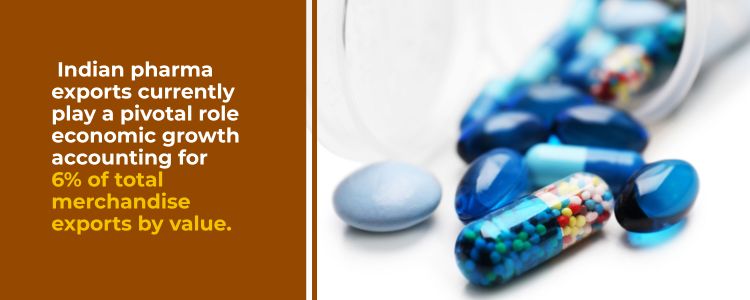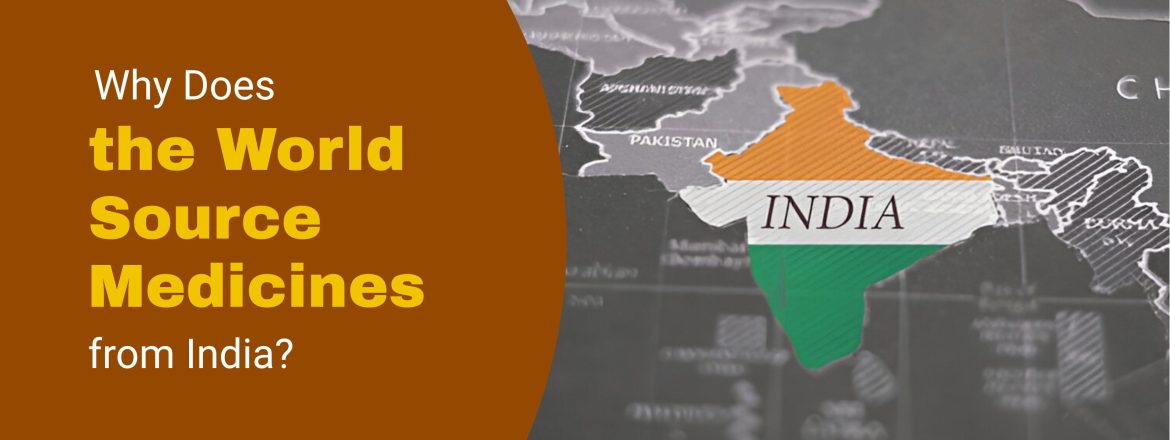Why Does the World Continue to Source Medicines from India?
India, with a population of 1.4 billion people, is the country of Bollywood, cricket, delicious cuisine, and most importantly, the pharmaceutical industry. The nation supplies about 20% of all generic drugs and is known as the “pharmacy of the world.” India produces affordable versions of brand name medicines, which are widely prescribed around the world. The Indian pharmaceutical industry is growing rapidly, as the country’s pharma export market will increase at least tenfold by 2047, bringing its value to $350 billion.
India is enhancing its ecosystem for research and development and also boosting pharmaceutical exports. While the pandemic affected the entire world, the Indian pharmaceutical industry was on the path of innovation and growth. In the US, nine out of ten prescriptions prescribed are for generics, and India provides around 40% of those generic drugs, while in the UK, it supplies around 33% of generics, which account for four out of five NHS prescriptions. India is also a key source of pharmaceutical medical equipment, particularly for global export.
Over the past few decades, pharmaceutical outsourcing from India has evolved into a globally competitive industry that plays a crucial role in public health systems around the world. This is because its pharmaceutical industry supplies a wide range of generic medicines, active pharmaceutical ingredients (APIs), and vaccines, making it essential to worldwide healthcare.
India and its History of Medicines
In 1970, the Patents Act changed, and this became the milestone for the Indian pharmaceutical sector. After this, Indian companies could now reverse-engineer branded drugs and develop affordable alternatives, which are commonly known as generics.
India’s generics industry first gained global attention in the early 2000s, when a Mumbai-based producer gained access to HIV medications. With no patent protection in place in India at the time, that company managed to create a drug combination that could be priced far lower than the patented versions sold by pharma companies.
The move helped to reduce the annual cost per patient of HIV/Aids treatment in Africa from about $15,000 in the 1990s to approximately $200 in 2005 .
Production and exports of medicines boomed, and Indian pharmaceutical companies soon flourished. Even when patent laws were hardened in 2005, the country managed to remain relevant by focusing on making and exporting drugs. Key to this success were India’s cost-effective labor and manufacturing processes.

Reasons for India as a Medicine Leader
Below are the key reasons why the world continues to source medicines from India:
1. Massive Production and Leadership in Generic Medicines
Indian medicines are biologically equivalent versions of branded drugs but considerably cheaper, making them essential for affordable healthcare. Pharmaceutical companies here have successfully developed and exported thousands of generic medicines used to treat a wide range of diseases, including hypertension, diabetes, cancer, and infectious diseases.
2. Strong and Cost-Effective Manufacturing
India possesses over 3,000 pharmaceutical companies and more than 10,500 manufacturing units, which are certified by top international regulatory bodies: like U.S. Food and Drug Administration (USFDA), World Health Organization (WHO), European Medicines Agency (EMA), and UK MHRA (Medicines and Healthcare products Regulatory Agency)
One of India’s greatest advantages is its cost efficiency. Medicines manufactured in India are typically cheaper than in Western countries without compromising on quality due to lower labor costs, economies of scale, established supply chains for raw materials, and favorable government policies.
This pricing advantage empowers Indian pharma exports to supply affordable medicines to public health systems and NGOs.
3. Expertise in Complex Generics and Scientific Talent
Indian pharmaceutical companies have moved over basic generics to develop complex generics, biosimilars, and specialty drugs. These include injectables, inhalers, oncology drugs, and insulin that require advanced research and technology.
India has a vast pool of qualified professionals, including chemists, pharmacists, biotechnologists, and engineers. This talent base supports both R&D and high-volume production with attention to efficiency, quality, and innovation.
4. Leadership in Bulk Drug Production and Active Pharmaceutical Ingredients (APIs)
Indian pharma exports is leading in the production and export of active pharmaceutical ingredients (APIs), a primary raw material of medicines. India’s capacity has grown rapidly, with the government supporting API parks.
This API strength enables India to produce a wide range of medicines quickly and at a higher scale as a global medicine hub.
5. Vaccine Powerhouse
India plays an important role in vaccine production, especially for global public health initiatives. The Serum Institute of India, based in Pune, along with other companies like Bharat Biotech and Biological E, is the one of the largest vaccine manufacturers in the world by volume, supplying vaccines for diseases like polio, measles, HPV, meningitis, and COVID-19.
India’s vaccine exports have been essential for organizations like UNICEF, GAVI, and the WHO, particularly in low-income and developing countries. During the COVID-19 pandemic, India has supplied nearly 300 million doses to countries around the world through its “Vaccine Maitri” initiative.
6. Government Support and Export-Friendly Policies
The Indian government actively supports pharmaceutical exports through its production linked incentive (PLI) schemes, tax incentives and infrastructure funding, export promotion councils, and fast-tracking of regulatory approvals.
Conclusion
India’s pharmaceutical industry is increasing as investment in quality, innovation, and self-reliance is shaping up to be the future of global healthcare. The pharma industry of India stands as a strong pillar of worldwide healthcare with its ability to deliver high-quality, affordable, and reliable medicines. India will continue to shape the future of global health with skilled talent, strong infrastructure, and a commitment to quality.
So thinking of sourcing the medicines from India ? Consider Inductus Global. We are the number one import export company in India, offering wholesale pharmaceutical products from vendors who are GMP certified by WHO for the best synthetic and non-synthetic drugs and tools. We have a strong network of medicine distributors providing safe, standard, affordable, and high-quality wholesale medical supplies that help us outshine competitors.









